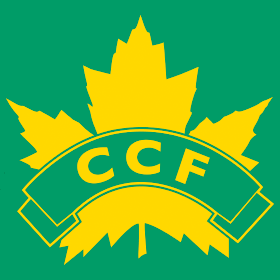
The Co-operative Commonwealth Federation (CCF) was a social-democratic and democratic socialist political party in Canada. The CCF was founded in 1932 in Calgary, Alberta, by a number of socialist, agrarian, co-operative, and labour groups, and the League for Social Reconstruction. In 1944, the CCF formed the first social-democratic government in North America when it was elected to form the provincial government in Saskatchewan. In 1961, the CCF was succeeded by the New Democratic Party (NDP). The full, but little used, name of the party was Co-operative Commonwealth Federation (Farmer-Labour-Socialist).
The Regina Manifesto was the programme of the Co-operative Commonwealth Federation (CCF) and was adopted at the first national convention of the CCF held in Regina, Saskatchewan, in 1933. The primary goal of the Regina Manifesto was to eradicate the system of capitalism and replace it with a planned socialist economy. The CCF was a Canadian democratic socialist party founded in 1932 by farmers, workers, and socialist groups against the backdrop of the Great Depression.

The Communist Party of Canada is a communist political party in Canada founded in 1921 under conditions of illegality. Although it is now a political party without any parliamentary representation, the party's candidates have been elected to the Parliament of Canada, the Ontario legislature, the Manitoba legislature, and various municipal governments across the country. The party has also contributed significantly to trade union organizing and labour history in Canada, peace and anti-war activism, and many other social movements.

David Lewis was a Canadian labour lawyer and social democratic politician. He was national secretary of the Co-operative Commonwealth Federation (CCF) from 1936 to 1950, and one of the key architects of the New Democratic Party (NDP) in 1961. In 1962, he was elected as the Member of Parliament (MP), in the House of Commons of Canada, for the York South electoral district. While an MP, he was elected the NDP's national leader, and served from 1971 until 1975. After his defeat in the 1974 federal election, he stepped down as leader and retired from politics. He spent his last years as a university professor at Carleton University, and as a travel correspondent for the Toronto Star. In retirement, he was named to the Order of Canada for his political service. After suffering from cancer for a long time, he died in Ottawa in 1981.
Socialist Studies is the name of a quarterly socialist periodical and of the group which publishes it. The group was founded in 1991 by sixteen expelled members of the Socialist Party of Great Britain (SPGB) who claim that their expulsions were the result of an anti-socialist conspiracy. Though small, the group has remained an active and vocal critic of the SPGB since its inception.

The first Socialist Party of Canada (SPC) existed from 1904 to 1925 led by E. T. Kingsley. It published the Western Clarion newspaper.

James Shaver Woodsworth was a pioneer in the Canadian social democratic movement. While studying at Oxford, he became interested in social welfare, and upon his return to Canada as a minister of the Methodist church he preached the Social Gospel to the poor and the working classes of Manitoba. As the superintendent of the All People's Mission in Winnipeg and the secretary of the Canadian Welfare League he focused on investigating social conditions, worked with immigrants and campaigned for social welfare.
The Winnipeg Declaration was the programme adopted by the Co-operative Commonwealth Federation (CCF) in Canada to replace the Regina Manifesto. Its full name is the "1956 Winnipeg Declaration of Principles of the Co-operative Commonwealth Federation" and it was adopted at the party's national convention held that year in Winnipeg, Manitoba.
The Socialist Party of Manitoba (SPM) was a short-lived social democratic political party launched in 1902 in the Canadian province of Manitoba. The organisation advanced a moderate programme of social reform legislation. In 1904 the SPM became one of the constituent units founding the Socialist Party of Canada, an organisation which continued until 1925.

The Communist Party of Canada (Manitoba) is the provincial wing of the Communist Party of Canada for the province of Manitoba. Founded in 1921, it was an illegal organization for several years and its meetings were conducted with great secrecy. Until 1924, the "Workers Party" functioned as its public, legal face. For a period in the 1920s, the party was associated with the Canadian Labour Party. After 1920 it attracted former members of radical and syndicalist groups such as the Industrial Workers of the World (IWW). Many of the new members were Jews, Finns or Ukrainians who supported the Russian Revolution.

The World Socialist Party of the United States (WSPUS) is a socialist political organization that was established in Detroit, Michigan as the Socialist Party of the United States in 1916 and which operated as the Socialist Educational Society in the 1920s before being renamed the Workers' Socialist Party. The organization reemerged in the 1990s and exists today as the American companion party of the World Socialist Movement.
The Socialist Party of British Columbia (SPBC) was a provincial political party in British Columbia, Canada, from 1901 to 1905. In 1903, the SPBC won seats in the Legislative Assembly of British Columbia. The SPC never won seats in the House of Commons of Canada.

Socialism in Canada has a long history and along with conservatism and liberalism is a political force in Canada.
The Socialist Party of North America (SPNA) was a political party founded in 1911 and the first in North America to adopt the Object and Declaration of Principles of the Socialist Party of Great Britain (SPGB).
The Ukrainian Social Democratic Party (USDP), originally called the Federation of Ukrainian Social Democrats (FUSD), was a Ukrainian Canadian socialist political party that existed from 1910 to 1918.

Impossibilism is a Marxist theory that stresses the limited value of political, economic, and social reforms under capitalism. As a doctrine, impossibilism views the pursuit of such reforms as counterproductive to the goal of achieving socialism as they stabilize, and therefore strengthen, support for capitalism. Impossibilism holds that reforms to capitalism are irrelevant or outright counter-productive to the goal of achieving socialism and should not be a major focus of socialist politics.
The Socialist Party of Great Britain (SPGB) is a socialist political party in the United Kingdom. Founded in 1904 as a split from the Social Democratic Federation (SDF), it advocates using the ballot box for revolutionary purposes and opposes both Leninism and reformism. It holds that countries which claimed to have established socialism had only established "state capitalism" and was one of the first to describe the Soviet Union as state capitalist. The party's political position has been described as a form of impossibilism.
The World Socialist Movement (WSM) is an international organisation of socialist parties created in 1904 with the founding of the Socialist Party of Great Britain (SPGB).
Reformism is a political doctrine advocating the reform of an existing system or institution instead of its abolition and replacement.









